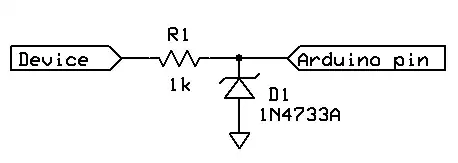At work, I have connected an Arduino to a security key (which has a 12v power supply) in order to give us a more versatile door lock. Unfortunately, people keep removing the key pad, disconnecting the wires and re-connecting them (defective keypad I guess.) In the process, I am afraid that they will accidentally send 12v into the Vcc, ground, digital in, and/or analog in pins. What is the best way to protect my Arduino from the 12 volts? I really need a component or two that I can to my pins.
Edit: it is difficult for me to describe this problem without mentioning the danger to all components. Please describe ways to protect digital outputs HERE
